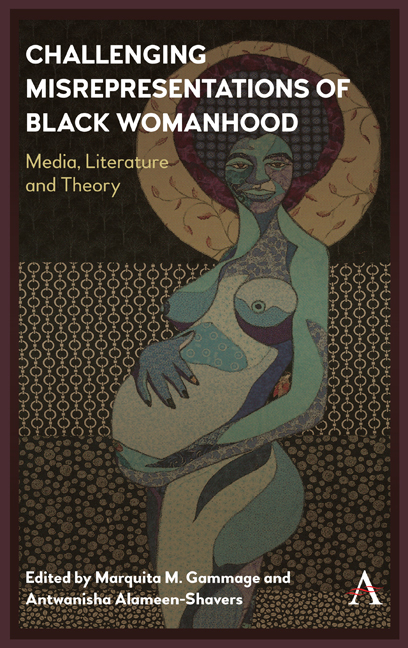Book contents
- Frontmatter
- Contents
- List of Figures
- Acknowledgments
- Introduction
- Chapter 1 Black Student Mothers: A Culturally Relevant Exploratory Study
- Chapter 2 Uninhabitable Moments: The Symbol of Serena Williams, Rage and Rackets in Claudia Rankine's Citizen: An American Lyric
- Chapter 3 “Black Women Are Genius!”: The Image of Celebrated Black Motherhood in Stand-Up Comedy?
- Chapter 4 The Virility of the Haitian Womb: The Biggest Threat to the Dominican Right
- Chapter 5 Ladyhood in Distress: Neoliberalism and Black Politics in Nicole Sconiers's Escape from Beckyville: Tales of Race, Hair, and Rage
- Chapter 6 Sapphires Gone Wild: The Politics of Black Women's Respectability in the Age of the Ratchet
- Chapter 7 Representing the Black Woman as Immoral and Abandoning the Black Family: A Cultural Analysis of Twenty-First-Century Television Dramas Starring Black Women
- Chapter 8 Historical Miseducation on Black Womanhood
- Chapter 9 Michelle Obama Laughs: Political Meme Warfare and the Regurgitation of the Mythological Black Woman
- Chapter 10 Kawaida Womanism as an Interpretative Framework for Understanding Africana Womanhood: Analyzing African American Women's Self-Perceptions
- List of Contributors
- Index
Introduction
Published online by Cambridge University Press: 29 May 2019
- Frontmatter
- Contents
- List of Figures
- Acknowledgments
- Introduction
- Chapter 1 Black Student Mothers: A Culturally Relevant Exploratory Study
- Chapter 2 Uninhabitable Moments: The Symbol of Serena Williams, Rage and Rackets in Claudia Rankine's Citizen: An American Lyric
- Chapter 3 “Black Women Are Genius!”: The Image of Celebrated Black Motherhood in Stand-Up Comedy?
- Chapter 4 The Virility of the Haitian Womb: The Biggest Threat to the Dominican Right
- Chapter 5 Ladyhood in Distress: Neoliberalism and Black Politics in Nicole Sconiers's Escape from Beckyville: Tales of Race, Hair, and Rage
- Chapter 6 Sapphires Gone Wild: The Politics of Black Women's Respectability in the Age of the Ratchet
- Chapter 7 Representing the Black Woman as Immoral and Abandoning the Black Family: A Cultural Analysis of Twenty-First-Century Television Dramas Starring Black Women
- Chapter 8 Historical Miseducation on Black Womanhood
- Chapter 9 Michelle Obama Laughs: Political Meme Warfare and the Regurgitation of the Mythological Black Woman
- Chapter 10 Kawaida Womanism as an Interpretative Framework for Understanding Africana Womanhood: Analyzing African American Women's Self-Perceptions
- List of Contributors
- Index
Summary
Caricatures, memes, myths, stereotypes and flat-out lies have dominated the social perceptions of Black womanhood. Political figures, celebrities, television personalities and everyday average Black women have been victimized by the sociopolitical racist and sexist ideologies that control the discourse entrapping Black females. Black women's respectability continues to suffer given theses systematic assaults, which has swelled into microaggressions, insults and blatant racism. Not one Black woman has been excluded from these vicious injustices, not even the former first lady of the United States. In 2009, Michelle Obama became the first African American first lady of the United States of America, yet her womanhood was unfailingly contested. Despite her many accolades, Michelle Obama was reduced to a slave-descended baby mama. News media, magazines, social media outlets and political commentators questioned the legitimacy of her serving as first lady from the time her husband, Barack Obama, first announced his candidacy for the presidency. This gross mistreatment of her right to serve as first lady illustrates the profound impact of racism, sexism and racial hatred on Black womanhood. Even still, like the millions of African foremothers that came before her, Michelle Obama proclaimed and affirmed her womanhood in her commitment to motherhood and service to others. Her dedication extended beyond her family, as she launched national campaigns focused on health and wellness. Michelle Obama's womanhood embodied the core principles of African womanhood as she unapologetically embraced her African American heritage. Similar to Black women across the nation and world, self-definition and determination proved to be pivotal in the survival of Black womanhood amid egregious condemnation of their humanity.
The Mammy, Jezebel and Sapphire stereotypes have long been used to inform the world's understanding of Black womanhood and continue to guide perceptions of Black women globally (Allison 2016; Gammage 2015). Although created in the nineteenth century, these racialized myths have endured for three centuries and have governed the treatment of Black womanhood in media, literature, theory, law and politics. As they transitioned into media and literature, Black women's image was bound to these exploitative labels. Yet, despite these falsifications, Black women have continuously fought against racial and gender oppression for themselves and their communities.
- Type
- Chapter
- Information
- Challenging Misrepresentations of Black WomanhoodMedia, Literature and Theory, pp. 1 - 8Publisher: Anthem PressPrint publication year: 2019



